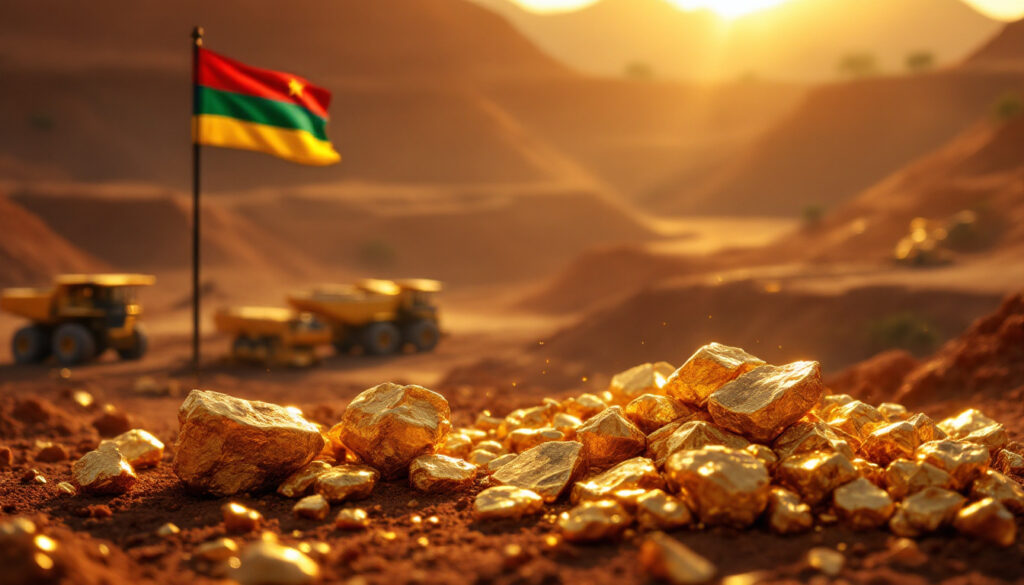How Is Burkina Faso Increasing State Control Over Foreign-Owned Mines?
Burkina Faso's military government has embarked on an ambitious strategy to assert greater control over the country's valuable mining sector, implementing a series of decisive actions that signal a fundamental shift in how the nation manages its natural resources. This resource nationalism movement represents one of the most aggressive mineral sovereignty campaigns in West Africa's recent history.
Burkina Faso's Mining Nationalization Strategy
The government has established a clear framework for expanding state ownership of mining assets through the newly formed Société de Participation Minière du Burkina (SOPAMIB). This state mining company has become the primary vehicle for acquiring foreign-owned operations and increasing national participation across the sector.
"SOPAMIB has already recovered two industrial mines from foreign control, and this process will continue," Prime Minister Jean Emmanuel Ouédraogo declared in an April 2025 statement that underscored the government's determination to reshape the mining landscape.
These acquisitions include the strategic Boungou and Wahgnion gold mines, previously operated by Canadian-based Endeavour Mining. Industry analysts note these mines collectively produced approximately 337,000 ounces of gold in 2023, representing nearly 20% of the country's industrial gold output.
New Mining Code Implementation
Beyond direct acquisitions, Burkina Faso has enacted comprehensive revisions to its mining code, creating a legal framework that fundamentally alters the operating environment for foreign companies. The new regulations include:
- Mandatory employment quotas favoring Burkinabe nationals in technical and management positions
- Preferential procurement requirements benefiting local suppliers
- Increased royalty rates on mineral production
- Expanded state participation rights in all mining ventures
"This represents nothing less than a revolution in how we manage our natural resources," explained Mining Minister Adama Sorgho during the code's introduction. "For too long, our mineral wealth has enriched others while our people remain impoverished."
The code notably empowers SOPAMIB to exercise pre-emptive rights when mining licenses change ownership, ensuring the government can intervene in any potential foreign-to-foreign transactions involving Burkinabe mining assets.
Why Is Burkina Faso Nationalizing Its Mining Industry?
The drive toward increased state control over foreign-owned mines stems from both economic necessity and a shifting political ideology following the military takeovers of 2022.
Economic Sovereignty Goals
Gold represents approximately 75% of Burkina Faso's export earnings, making mining central to the nation's economic stability. Despite this mineral wealth, the government contends that historical arrangements have failed to deliver appropriate benefits to the Burkinabe people.
"We are rejuvenating an economy severely impacted by ongoing security challenges," Prime Minister Ouédraogo stated. "Ensuring that our gold resources directly benefit our national treasury is essential for funding both security operations and development initiatives."
The government faces significant economic pressures. Foreign direct investment reportedly declined by approximately 30% following the 2022 coups, while security expenditures increased dramatically to combat insurgent groups operating in mining regions. This financial squeeze has accelerated the push to capture more mining revenue.
"Gold is our patrimony, and its benefits must first serve Burkina Faso before enriching foreign shareholders," stated President Ibrahim Traoré in a March 2025 address to the nation.
Regional Resource Nationalism Trends
Burkina Faso's approach mirrors similar initiatives across the Sahel region, where military governments in Mali and Niger have also moved to increase state control over natural resources.
Mali amended its mining code in 2023 to mandate a minimum 35% state ownership in all mining projects, while Niger revoked uranium concessions from French company Orano in favor of Russian interests. These parallel movements reflect a regional rejection of what many perceive as neo-colonial resource extraction patterns.
Professor Moussa Diallo of the University of Ouagadougou notes: "We're witnessing a coordinated reassertion of mineral sovereignty across former French colonies in West Africa. These governments share both a military character and a determination to rewrite economic relationships with traditional Western partners."
What Results Has Burkina Faso Seen From State-Controlled Mining?
Early outcomes from the nationalization strategy show mixed results, with promising revenue collection but limited transparency regarding operational efficiency.
Gold Production Achievements
According to government figures, state gold collection has improved significantly:
| Period | Gold Collection (tonnes) | Primary Source |
|---|---|---|
| 2024 (Full Year) | 8.2 | Artisanal Mining |
| 2025 (Q1 Only) | 11.3 | Artisanal + Industrial |
"Our National Precious Substances Company has demonstrated the viability of our approach," stated Prime Minister Ouédraogo. "We have collected more gold in the first quarter of 2025 than in all of 2024, proving that our model works."
However, independent mining investment guide analysts note this data combines production from newly nationalized industrial mines with formalized artisanal mining, making direct comparisons difficult. The government has not released detailed production costs or efficiency metrics that would facilitate analysis of operational performance under state management.
National Gold Reserve Establishment
In a historically significant development, Burkina Faso announced the creation of its first national gold reserve in February 2025. This strategic reserve represents a fundamental shift in the country's approach to managing its mineral wealth.
"Rather than immediately converting our gold to foreign currencies, we are building a sovereign wealth foundation based on our most valuable resource," explained Finance Minister Aboubakar Nacanabo. "This will strengthen our economic independence and resilience against external shocks."
While the government has not disclosed the reserve's current holdings, officials indicate the goal is to accumulate 50 tonnes by 2030—approximately equivalent to one year of the country's total gold production. By comparison, neighboring Ghana maintains a gold reserve of 8.7 tonnes.
The central bank has established a dedicated secure facility in Ouagadougou for storing physical gold assets, with verification protocols involving both domestic and international auditors to ensure transparency.
How Are Foreign Investors Responding To These Changes?
The nationalization push has created significant uncertainty in Burkina Faso's mining investment landscape, altering traditional partnership patterns and introducing new players.
Investment Climate Concerns
Western mining companies with established operations in Burkina Faso have expressed serious concerns about the security of their investments. Industry representatives highlight several specific issues:
- Lack of clear compensation mechanisms for nationalized assets
- Uncertainty regarding which operations might be targeted next
- Concerns about fair valuation of acquired properties
- Questions about legal recourse under bilateral investment treaties
"There's understandable anxiety about the sanctity of contracts and the protection of shareholder value," noted mining analyst François Ouattara. "Companies are placing expansion plans on hold and reassessing risk profiles for existing operations."
Foreign direct investment in Burkina Faso's mining sector reportedly fell by approximately 40% in 2024, though this decline also reflects broader regional security concerns beyond nationalization policies.
Shifting International Partnerships
As relations with traditional Western partners deteriorate, Burkina Faso has pivoted toward new international alignments, particularly with Russia.
The clearest evidence of this shift came in March 2025 when the government awarded an industrial mining license to Russian company Nordgold for a significant project in Kourweogo province. This represented the first major mining concession granted since the 2022 coups.
"We welcome partners who respect our sovereignty and share our vision of mutually beneficial development," stated Mining Minister Sorgho at the license signing ceremony.
Industry observers note that Nordgold's license terms reportedly include:
- 30% state ownership through SOPAMIB (higher than previous foreign agreements)
- Commitments to establish local processing facilities
- Integration with Russian security cooperation arrangements
This emerging Russia-Burkina Faso mining relationship aligns with broader security cooperation, including the reported presence of Wagner Group personnel at key mining sites since mid-2023.
What Are The Potential Impacts Of Burkina Faso's Mining Reforms?
The nationalization strategy presents both significant opportunities and substantial risks for Burkina Faso's economic future and geopolitical investor strategies.
Economic Benefits and Risks
Potential benefits include:
- Enhanced revenue capture: Direct state ownership potentially increases the government's share of mining profits beyond traditional royalty and tax arrangements.
- Value chain integration: The new mining code encourages domestic processing and refining, potentially capturing more of the value chain within Burkina Faso.
- Artisanal sector formalization: State collection systems are bringing previously informal gold production into official channels.
However, economic analysts highlight substantial risks:
- Operational efficiency concerns: State-owned enterprises historically face challenges maintaining productivity without technical and management expertise typically provided by international mining companies.
- Capital constraints: The government may struggle to fund necessary mine maintenance and expansion investments, potentially leading to declining production over time.
- Investment deterrence: The perception of elevated expropriation risk could prevent new exploration and development, undermining long-term production capacity.
"The critical question is whether SOPAMIB can maintain operational efficiency while implementing the government's social and economic objectives," explains Dr. Aminata Koné, economist at the University of Bobo-Dioulasso. "The experience of nationalized mines across Africa suggests this balance is extremely difficult to achieve."
Mining contributes approximately 15% of Burkina Faso's GDP, making any production disruptions potentially devastating for the broader economy.
Geopolitical Implications
Burkina Faso's mining reforms represent more than economic policy—they signal a fundamental geopolitical realignment with far-reaching implications:
-
Regional bloc formation: Alongside Mali and Niger, Burkina Faso has formed the Alliance of Sahel States, creating a resource-rich bloc increasingly aligned with Russia and China rather than traditional Western partners.
-
Financial system challenges: The country faces potential difficulties accessing international capital markets and banking systems as relations with Western financial institutions deteriorate.
-
Border security complexities: Artisanal gold has historically flowed across porous borders, creating enforcement challenges as neighboring countries maintain different regulatory approaches.
-
Influence competition: Russian interest in Burkina Faso's gold sector appears linked to broader strategic competition with France and other Western nations for influence in resource-rich West Africa.
The government's withdrawal from ECOWAS in January 2023 further underscores this geopolitical shift, signaling a decisive break with Western-aligned regional structures in favor of more autonomous resource governance.
How Does Burkina Faso's Mining Sector Compare Regionally?
Understanding Burkina Faso's mining nationalization requires contextualizing it within West Africa's broader gold production landscape and varying approaches to state participation.
West African Gold Production Context
Burkina Faso ranks as West Africa's fourth-largest gold producer, with significant untapped potential:
| Country | Annual Gold Production (tonnes) | State Ownership Approach |
|---|---|---|
| Ghana | 90-110 | Mixed (10-20% state share) |
| Mali | 65-75 | Minimum 35% state ownership |
| Guinea | 55-65 | State participation rights |
| Burkina Faso | 45-55 | Increasing direct ownership |
| Niger | 10-15 | Selective nationalization |
The country's gold reserves are concentrated in three primary belts: Hounde, Boromo, and Banfora, with geological structures similar to Ghana's prolific Ashanti belt. Despite significant exploration, geological experts estimate that only about 60% of Burkina Faso's gold potential has been properly evaluated.
"Burkina Faso's mineralization characteristics are exceptionally favorable, with relatively shallow deposits and good ore grades averaging 1.5-2.5 g/t in most commercial operations," notes geologist Dr. Henri Ouédraogo. "This makes the deposits attractive for both industrial and artisanal extraction."
Comparative Nationalization Approaches
While resource nationalism is rising across West Africa, implementation approaches vary significantly:
- Mali has focused on increasing minimum state ownership percentages while maintaining foreign operational management.
- Ghana employs a more balanced approach, maintaining foreign investment while ensuring state participation through equity stakes.
- Burkina Faso has pursued the most aggressive direct acquisition strategy, taking full control of operating mines.
Industry observers note that Burkina Faso's approach most closely resembles Zimbabwe's controversial mining nationalization of the 2000s, which led to production declines and investment flight. However, the government argues its model more closely parallels Botswana's successful diamond sector management, where state participation generated significant development benefits.
What Legal Frameworks Support Burkina Faso's Mining Reforms?
The government has constructed a multi-layered legal foundation for its mining sector reforms, combining domestic legislation with selective disengagement from international obligations.
Constitutional and Legislative Basis
Burkina Faso's mining nationalization strategy rests on several legal pillars:
-
Constitutional sovereignty provisions: The constitution establishes natural resources as national patrimony to be managed for public benefit.
-
Revised Mining Code of 2023: This comprehensive legislation:
- Increases mandatory state participation rights
- Establishes local content requirements
- Creates preference for domestic processing
- Authorizes SOPAMIB's acquisition activities
-
Presidential decrees: Executive orders have established specific implementation mechanisms, including the creation of SOPAMIB and the national gold reserve.
The legal framework explicitly prioritizes "national economic interest" as justification for increased state control, a concept that appears repeatedly in government communications about the mining sector.
International Investment Protections
Foreign mining companies theoretically maintain certain protections under international law, though practical enforcement has become increasingly challenging:
-
Bilateral Investment Treaties (BITs): Burkina Faso has signed BITs with 15 countries, including Canada, France, and the UK, which typically include expropriation compensation provisions.
-
ICSID Convention: The country remains a signatory to the International Centre for Settlement of Investment Disputes convention, theoretically providing an arbitration mechanism for disputes.
-
ECOWAS Mining Code: Prior to its withdrawal from ECOWAS, Burkina Faso was subject to regional standards for mining investment protection.
However, the military government has signaled skepticism toward international arbitration mechanisms, with Mining Minister Sorgho stating in November 2024: "We will not allow foreign tribunals to dictate how we manage our natural resources."
Legal experts note that enforcement of any international arbitration awards would prove extremely difficult in the current political context, creating significant uncertainty for affected companies seeking compensation.
FAQ: Burkina Faso's Mining Nationalization
Will foreign mining companies be completely excluded from Burkina Faso?
No, the government has not announced intentions to exclude all foreign mining companies. Rather, officials have indicated a preference for "partnerships that respect Burkinabe sovereignty." The Nordgold license demonstrates continued openness to foreign investment under terms more favorable to national interests, suggesting a selective approach rather than complete exclusion.
Foreign companies with specialized technical expertise may find continued opportunities, particularly if willing to accept increased state participation and local content requirements. However, Western firms may face greater scrutiny than Russian or Chinese operators given the government's geopolitical realignment.
How might these changes affect global gold markets?
While Burkina Faso is a significant gold producer, its approximately 50 tonnes of annual production represents just 1.5% of global market insights, limiting immediate market impacts. However, the situation warrants monitoring for several reasons:
- If production efficiency declines under state management, the modest supply reduction could marginally support gold prices.
- The precedent could influence other producing nations to adopt similar policies, potentially creating cumulative supply concerns.
- Uncertainty regarding Burkina Faso's gold marketing channels may affect traditional trading relationships.
Gold market analysts note that production disruptions from political instability have historically been priced into market risk premiums for West African gold, limiting additional impacts from policy changes alone.
What safeguards exist for existing foreign investments?
Formal safeguards for foreign mining investments in Burkina Faso have significantly weakened since 2022. While the country technically maintains bilateral investment treaties with several nations, practical enforcement mechanisms remain unclear.
Companies subject to nationalization have limited recourse options:
- Negotiation directly with SOPAMIB regarding compensation terms
- Appeal to diplomatic channels through their home governments
- International arbitration, though enforcement would be challenging
- Restructuring operations to maintain minority ownership positions
"The most pragmatic approach appears to be negotiating acceptable exit terms rather than pursuing protracted legal challenges," advises international mining attorney Christine Durand. "Companies that resist nationalization may face operational obstacles that ultimately reduce asset value."
How is artisanal mining affected by these reforms?
Artisanal mining, which accounts for an estimated 15-20% of Burkina Faso's gold production, has been significantly impacted by the government's reforms. The National Precious Substances Company has established formal collection centers in major artisanal mining regions, offering fixed purchase prices and simplified licensing procedures.
This formalization approach has:
- Increased government revenue: By bringing previously informal production into official channels
- Improved traceability: Reducing informal cross-border flows of gold
- Created price stability: Offering consistent purchase prices to artisanal miners
- Raised safety concerns: As productivity pressures increase without corresponding safety investments
The government reports approximately 100,000 registered artisanal miners now participating in formal collection channels, though independent verification of these figures remains challenging
Want to Stay Ahead of Major ASX Mineral Discoveries?
Discovery Alert's proprietary Discovery IQ model provides real-time notifications when significant mineral discoveries are announced on the ASX, giving you the market edge before others recognise the opportunity. Visit our discoveries page to explore how historic mineral finds have generated exceptional returns for early investors.




